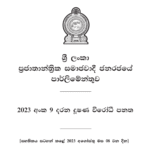Kushan Ediriweera v. Union Assurance Limited and Others (SC Appeal 65/2016)
Case Background
This case arose from a serious accident where Kushan Ediriweera, the plaintiff, was struck by a vehicle driven by the first defendant, Sadhasivam Sivagankan, on July 19, 2005. Ediriweera suffered significant injuries and filed a suit against Sivagankan, the vehicle’s driver; Tissaweerasingham Sundhararajan, the registered owner; and Union Assurance Limited, the insurance provider. The plaintiff sought compensation of Rs. 700 million. A key legal issue was whether Union Assurance Limited could deny liability based on an exclusion clause in the insurance policy that negated coverage when the driver was under the influence of alcohol. The case reached the Supreme Court after differing judgments from the District Court and the High Court.
Legal Issues
- Validity of the Exclusion Clause: Could the insurance company lawfully exclude liability for accidents involving drivers who had consumed alcohol, as stipulated in the insurance policy?
- Interpretation of Motor Traffic Act Provisions: Did the exclusion clause comply with Sections 99, 100, 102, and 109 of the Motor Traffic Act, specifically regarding mandatory third-party insurance coverage?
- Public Policy Considerations: Would enforcing the exclusion clause contradict the public policy intent behind mandatory third-party insurance, which aims to protect the public from harm caused by insured vehicles?
Court’s Findings
- Exclusion Clause and Third-Party Protection:
- The District Court ruled in favor of the plaintiff, reasoning that third-party insurance serves to protect the public. The court found that Union Assurance’s exclusion clause lacked specificity and did not clearly name individuals who were excluded from coverage, rendering it ineffective.
- The High Court overturned this decision, interpreting the clause as sufficiently specific to exclude the insurer’s liability due to the driver’s alcohol consumption.
- The Supreme Court, however, sided with the District Court, emphasizing that public interest in mandatory insurance overrides exclusion clauses that could restrict third-party coverage.
- Scope of the Motor Traffic Act:
- The Supreme Court examined the Motor Traffic Act’s provisions, which mandate third-party insurance to cover public risks associated with vehicle operation. It noted that Section 99 requires insurance for any vehicle used on public highways, while Section 100 requires policies to cover liabilities arising from death or injury to third parties.
- Under Section 102(1), policy conditions that restrict insurer liability toward third parties are void, except as allowed under Section 102(4), which permits exclusions under specific, narrowly defined conditions.
- The Supreme Court interpreted Section 102(4)(c)(i) as allowing insurers to exclude liability for specific individuals named in the policy, not for broad categories like “any person under the influence of alcohol.” This ruling clarified that insurers cannot use vague, generalized exclusions to bypass the statutory requirement for third-party insurance.
- Public Policy Considerations:
- The court highlighted the legislative intent behind mandatory third-party insurance, which is to ensure the public is compensated for harm caused by insured vehicles, regardless of the insured’s or insurer’s private contractual terms.
- The court cited past rulings and legislative debates that emphasized third-party insurance as a critical public safety measure. The ruling reinforced that insurers cannot escape liability by introducing ambiguous clauses that conflict with public interest.
- Decision on Liability:
- The Supreme Court restored the District Court’s decision, holding that Union Assurance could not exclude liability based on the alcohol-related exclusion clause. It ruled that the policy’s ambiguous wording undermined the legislative intent of public protection and was thus invalid regarding third-party coverage.
Judgment and Outcome
The Supreme Court allowed the appeal, setting aside the High Court judgment and reinstating the District Court’s decision. It held that Union Assurance must fulfill its third-party liability obligations under the insurance policy, as the exclusion clause contravened the Motor Traffic Act and public policy. The court emphasized that mandatory insurance exists primarily to protect third parties, and any attempt by insurers to circumvent this protection through exclusion clauses that lack specificity is unenforceable.
Implications of the Judgment
- Clarification on Third-Party Insurance Requirements:
- The ruling clarifies that third-party insurance policies must prioritize public protection and cannot include vague exclusionary terms to avoid liability.
- Enforcement of Public Policy in Insurance Contracts:
- This case underscores the importance of judicial scrutiny over insurance contracts, particularly when public interest is at stake. It highlights that exclusions in insurance policies must be narrowly tailored and explicitly defined.
- Impact on Insurers:
- Insurers in Sri Lanka must ensure that any exclusion clauses are precise and in compliance with statutory mandates to avoid liability. This case may prompt insurers to revise their policy terms to align with public policy and legislative intent.
Conclusion
The Supreme Court’s decision in this case upholds the legislative purpose of third-party insurance by preventing insurers from evading liability through imprecise exclusion clauses. The ruling emphasizes that public safety and the rights of third parties take precedence over contractual limitations, reinforcing the protective role of mandatory insurance in Sri Lanka. This judgment will serve as a reference point in interpreting third-party insurance policies, ensuring that public interests remain central in cases of vehicular accidents and insurance claims.
Read Full Judgement














